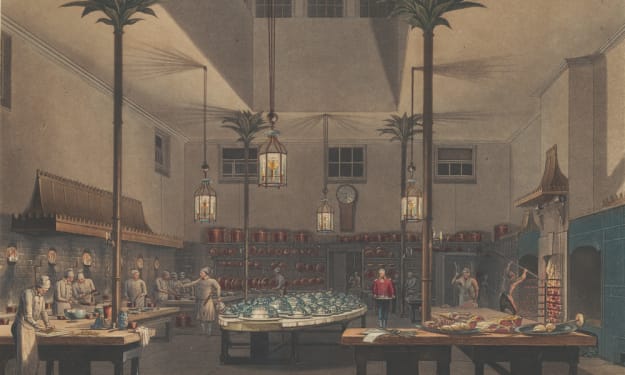How Commercial Kitchens Made Me Cynical
Cook’s Cynicism

Once upon a time, when I was a child, I wanted to grow up to become a mathematician. I dreamed of collecting data that could be used to solve mundane problems that could be key to a better society. My mom talked me out of it, she explained to me that teaching others how to count and measure wasn't going to pay for my bills—I wasn't going to be four years old forever, nor was she going to last me forever. Life wasn't a bunch of books I could store under my armpit and shelve whenever I didn't feel like reading it. Life was complicated and I didn't know better.
It wasn't until my mid-twenties I realized I have been living the dream all along. I never gave up on my childhood aspirations, but my job title was different: I was a line-cook. But not any line-cook, I was more of a professional culinarian; perhaps I was an aspiring chef? Did I want to be the head of a kitchen? (NO!). I never cared about being an authority on anything, though. It was all about the food. Beyond the mechanical transformations that food goes through before we can build it into a dish, there was something else, something that kept me cooking. Whatever it was, it hasn't gotten me anywhere yet, but inside me something had changed.
Eventually my inner child (the one that still wants to be a mathematician) gained some tools that allowed him to join the work force I once did and I was able to be content and happy. When I faced him I couldn't help but ask what he learned that made him accept this career and start pitching in.
The first thing he learned was efficiency: everything had a place to exist. Only we can assign objects a reason for being. It’s kind of like you are your God, creating your own reality that works for you. Does that mean the world is a blank canvas and we can do whatever we please with it? NO! It simply means we put things in a place for a reason, it enforces a sense of purpose. When everything is in its place, repetitive tasks are easily broken down into algorithms you execute effortlessly, over and over again. Does that mean that being efficient will reduce my workload and I get to do less? NO! It means you get to work efficiently. Ultimately, you accomplish more with less effort and leave extra time and energy to invest in new projects. Logical behavior is the foundation of efficient manners; this is a key source for every system applied in any industrial or commercial process. Such manners can be seen when scheduling employees, creating prep-lists, counting products before opening and closing, labeling and dating, following inventory, portioning, and waste control. Efficiency is what a professional (in this case a cook) thrives on, it is her/his never failing next gear. A decent cook always wants to be better.
Part of being a professional cook (or just a human) is a constant to desire to want a better job. It is natural to want to make better food or even work under healthier conditions or even make more money. Whatever the reason might be, hitting a wall with your employer can be a constant along the way, confrontation is a natural course between two entities with different purposes. Old school chefs came up with the term ''job-hoppers'' to refer to cooks that don’t keep the same job longer than a year. For reasons unknown they tagged me as one of those, so my inner child learned to value the term “adaptability” over “stability.” As soon as I had a job, my basic needs would be met—I was cooking every day, and nine times out of ten I had a place to sleep. I would stage for a job (and most times do really well), get offered a job, and give fantastic performances. Performances that would continue even after I learned how my bosses made money, although, eventually I would get sick of that and find another opportunity to stage. No respectable chef would sacrifice her/his food's integrity (a dish is only good as it’s ingredients), but they would diminish their own personal ethics if it gets things done their way.
Low wages, harassment, labor law violations, retaliation, drug trafficking, and even money laundering are some of the issues that any popular restaurants could suffer from these days. If you don't like how things are being done, no matter what you bring to the kitchen, you'll be shown the exit (in case you forgot where it was). Nonetheless, if you stay, you can learn how to bang out, in a consistent manner, eighty plates a night with only six burners and a dozen aluminum pans. Decent cooks love a good challenge; it builds a strong understanding of cooking methods. As a line cook it becomes your duty to take care of your station and use your resources wisely. As if it was your own restaurant, you are asked to make gold out of the little pile of turds they give you, as if you were an alchemist from ancient times on top of a cook. It made me a better professional on the long run.
Personally I never thought of myself as a ''job-hopper'.' At one point I settled in a job where my hard work was valued beyond the fact that someone else was filling their pockets with my labor. I would stay at any job that valued me as a human being—it has been almost a decade now and I am still a good-job-HOPER indeed.
I thought something was wrong with me for about the first five years of my career. So I kept on trying to be smarter, and work harder, but I was consuming my energy and my body faster than I was becoming a better cook. Eventually I had to start taking better care of myself, I had to create better habits that eventually translated to my job. This new awareness of the self allowed me to take a closer look at my peers. I started to get annoyed with their behavior after realizing how more difficult my job was because they refused to speak up and gave up on being better. This kept me away from more prestigious cooking jobs for years. I kind of felt like I knew better but I wasn't quite sure about that yet. Although this is when my inner child exponentially matured, I still craved my own identity as a cook. My techniques were on point and taking on their own style, I felt more responsible for my cooking. I was starting to feel more in control.
As I dug deeper it became clear that I could see the greater picture of what makes for a great restaurant aside from its food, what keeps vendors, cooks, and customers coming back. The same way a cook thrives on efficiency, a restaurant thrives on healthy symbiotic relationships. A contemporary restaurant is a delicate ecosystem where chefs, cooks, servers, runners, bussers, dishwashers, customers, purveyors, and even the city where it resides depend upon each other. If the equation is not properly balanced, meaning the system becomes corrupt at some point, the resulting product will never do justice to its individual components. If chefs treated their cooks as well as they treat their food, things could be different. If customers respected restaurants as they respected their own home, things could be different. If cities valued local restaurants as much as they valued corporations, things could be different. The equation will never be balanced out to zero, but it must at least even out; chefs making hundreds of thousands of dollars a year working eight hours shifts as creative managers does not even out with having to work 60 hours a week in front of a stove top just to be able to put some money away for the slow season, or scraping together pennies as a prep cook while doing all the tasks that no one else wants to execute.
Whatever the future brings, cooking will never become an easy craft to master (it shouldn't be). It takes a certain type of person to put on a very thick skin every day and stand for twelve hours with no breaks in front of a hot grill. It takes a certain type of person that loves what they do to keep going to work while fully aware that they are being taken advantage of. Isn't that what some people call “love for the craft”? Maybe that's why I was always given the jobs I wanted at the time, maybe chefs can see that in their prospective cooks; perhaps there is a secret unit that can measure how exploitable a cook is at any given moment.
Maybe this is my inner child's legacy. I was never a cook at all, I was no more than a replaceable piece of meat taking notes ferociously, a madman rolling on pareidolia (next level paranoia), desperately looking for the pattern supposedly rotting his world. One thing I am certain of is that if my own children ever confess to me that she/he wants to become a chef when they grow up, I cannot let my cynicism prevent me from giving them advice from the heart. The time to reinvent the cooking industry is now, a new foundation is imperative. My inner child has realized that he is incapable of fixing things from the inside. He had to break free to make a difference.






Comments
There are no comments for this story
Be the first to respond and start the conversation.